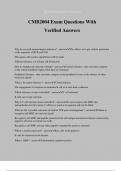Tentamen (uitwerkingen)
CMB2004 Exam Questions With Verified Answers
- Vak
- Instelling
©THEBRIGHTSTARS 2024 CMB2004 Exam Questions With Verified Answers Why do we need immunological tolerance? - answerThis allows us to get random generation of the repertoire of BCR and TCR This means self-reactive specificities will be made Without tolerance, we will get self destruction How ...
[Meer zien]




